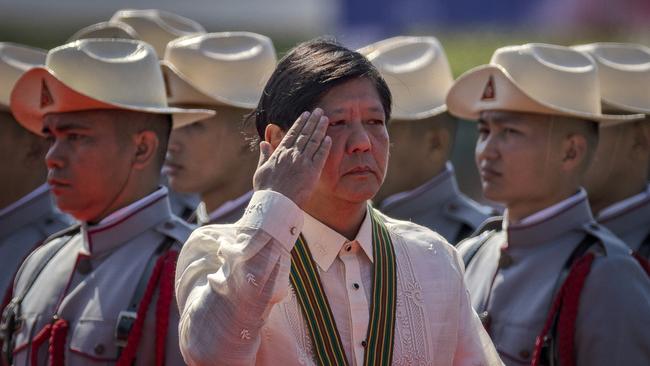Philippines must work with friends to counter ‘emerging threat’, says Ferdinand Marcos
The directive came before Chinese military said it warned a US guided missile destroyer to ‘leave’ waters in the South China Sea.

Philippines President Ferdinand ‘Bongbong’ Marcos has urged his nation’s military forces to forge stronger ties with like-minded foreign counterparts to help it face an “emerging threat” and more “unpredictable” security environment.
The directive came the day before the Chinese military said it warned American guided missile destroyer USS Milius on Thursday to “leave” waters in the South China Sea, claims swiftly denied as “false” by American forces.
It also came as The Philippines is preparing to host its largest ever Balikatan joint defence exercises next month with US forces and large observer contingents from Australia and Japan, and as more than 40 Chinese vessels swarmed the Manila-administered Thitu island in the disputed Spratly Chain.
More than 17,000 troops will participate in the exercise, which translates as “shoulder to shoulder” – double that of last year.
“The external security environment is becoming more complex, it is becoming more unpredictable,” Mr Marcos said during a speech to The Philippines’ Armed Forces on Wednesday that did not name China but was widely seen as a reference to Beijing’s increasing assertiveness in the disputed South China Sea.
“Continue to improve your relations with your counterparts overseas. Common security challenges necessitate a more concerted approach among like-minded nations. Share information, learn from the best practices in the region to make our military better.
“Be vigilant against elements that will undermine our hard-earned peace, our hard-earned stability. Continue to improve relations with your counterparts overseas,” he added, warning an “emerging threat” to Philippines territory would require “adjustments in our strategy”.
Under Mr Marcos, The Philippines has pivoted sharply back to its historic ally the US and treaty partner Australia, with which it is in talks to conduct maritime patrols in the South China Sea – over which China claims rights to more than 90 per cent. Manila has also stood alone among Southeast Asian nations as a supporter of the AUKUS agreement.
Tokyo and Manila are also negotiating a proposed reciprocal access agreement that would pave the way for more enhanced training and exercises between the two nations. In January, Mr Marcos even appeared to propose a possible Asian quadrilateral defence arrangement with Australia, South Korea and Japan to shore up his nation’s security, though has yet to elaborate on the idea.
Where former president Rodrigo Duterte played down the country’s US alliance in favour of stronger economic ties with Beijing, Mr Marcos has upgraded US- Philippines security ties by granting access to four new defence sites, on top of five existing locations under the 2014 Enhanced Defence Co-operation Agreement. Amid speculation over which additional bases would be made available to visiting US forces, Mr Marcos said on Wednesday they would be “scattered around The Philippines; some in the north, some around Palawan (which faces the Taiwan Strait), and some further south”.
“It’s really to defend our eastern coast … because of the continental shelf which is on the eastern side of Luzon,” he said, referring to The Philippines’ most populous island which lies 250km from Taiwan on the South China Sea. The US is understood to want access to three bases on Luzon facing north to Taiwan, and to one on Palawan near the South China Sea’s Spratly chain.
US Defence Secretary Lloyd Austin condemned China’s “grey zone” tactics in Philippines waters during a meeting this week with his counterpart Carlito Galves, and reiterated his commitment to the Mutual Defence Treaty which obliges the US to come to the defence of The Philippines’ armed forces, aircraft and public vessels, including the coastguard.
Manila accused China last month of directing a military-grade laser at a Philippines coastguard vessel deployed to resupply a naval outpost at the Second Thomas Shoal.
Several weeks later Chinese vessels began swarming Thitu, which is administered by Palawan provincial authorities but which China, Vietnam and Taiwan also claim as their own.
China’s foreign ministry on Wednesday repeated its warning that neighbouring countries should avoid being used by the US, which it accuses of raising tensions through increased regional military deployments.
But Jay Batongbacal, who heads The Philippines’ Institute for Maritime Affairs and Law of the Sea, said Mr Marcos’s pivot back to Western allies and partners reflected overwhelming public support in the country for the US alliance. “There is a real external security problem now and The Philippines, under the current administration, is finally realising that it has to catch up with all these security challenges by engaging more with its allies,” he told The Australian.




To join the conversation, please log in. Don't have an account? Register
Join the conversation, you are commenting as Logout